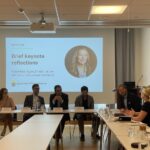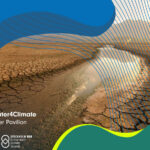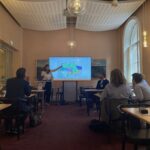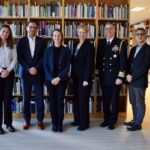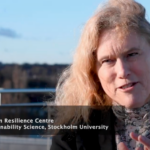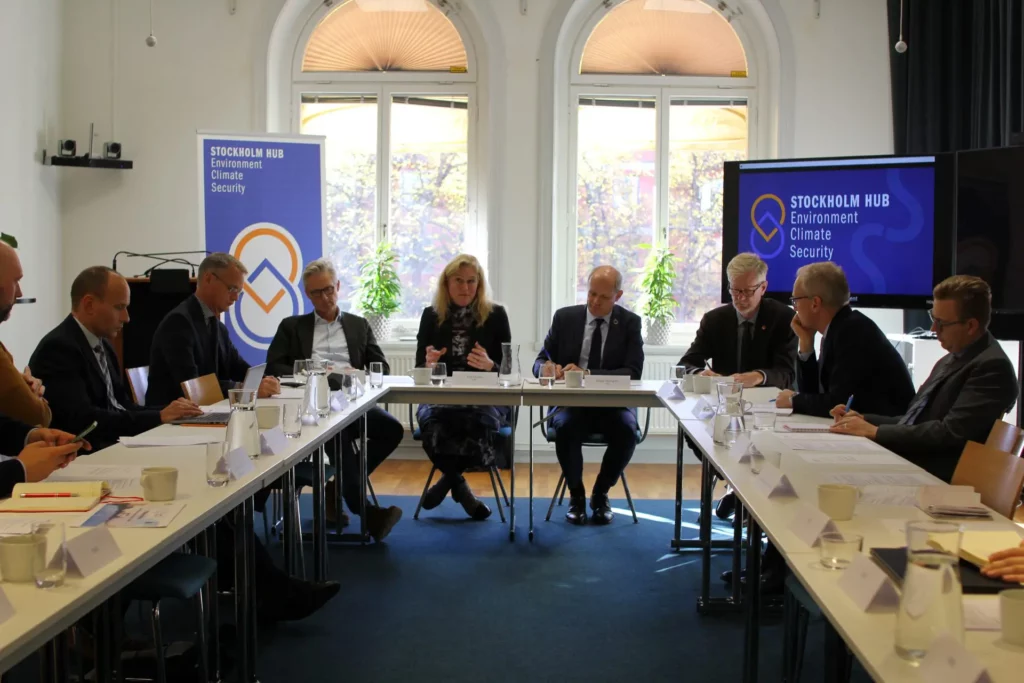
As the Swedish government plans for future scenarios with implications from climate change and environmental degradation, and is involved in climate negotiations, the Stockholm Hub will play a key role in feeding research and advice on policy in the face of climate change.
The Stockholm Hub on Environment, Climate and Security high-level meeting took place at SIWI on October 20, 2022. The meeting highlighted interlinkages and interdependencies between different regions that strengthen or dilute security, in the face of climate change. Earlier this year in August, the Hub convened a High-Level Panel on Climate and Peace at the World Water Week conference, hosted by SIWI in Stockholm.
The Hub brings together four leading research institutions to support the Swedish government with building resilience and improving prosperity in the face of interconnected crises and human insecurity. The institutions are SIWI, the Stockholm Resilience Centre (SRC), Stockholm Environment Institute (SEI) and Stockholm International Peace Research Institute (SIPRI).
Inputs from the Hub welcome to feed policy
Present in the room, Mattias Frumerie, Head of Delegation to United Nations Framework Convention on Climate Change (UNFCCC), Swedish Ministry of the Environment, said that, while negotiations at UNFCCC do not typically include conversations on security, it is clear that the impact of the war in Ukraine by Russia clearly influences the negotiations.
There is a window of opportunity to limit global warming and the implications of non-action for peace and security are severe. The Mitigation Work Programme will be determined at COP27, and the government of Sweden has high ambitions for the scope and inclusiveness of the programme, in order for it to be effective at curbing the more serious consequences of climate change. He welcomed research input from all four institutions of the Hub to formulate the most urgent and relevant policy solutions.
How climate change impacts security
So, how are security and climate change linked exactly?
Erik Widman who is newly appointed and the first Ambassador for Climate and Security for Sweden asked “What are the vulnerabilities that arise from climate change and impact our security?”
High costs of living, food shortages, and rising energy costs globally, due in part, to Russia’s aggression in Ukraine, were already affected by climate change consequences.
For example, sea level rise could become an obstacle to receiving military assistance through harbours. In another scenario, increased heat waves and droughts, caused by climate change, could cause more forest fires that require military support in the disaster response. Flooding and drought can impact infrastructure, that affects planning and preparedness – therefore security.
Widman also highlighted how climate change is leading to and could cause further instability in the neighbourhood with existing vulnerabilities, spilling over to Sweden in the future.
Reflections from the directors
The floor was then opened for the four directors of respective Hub institutions. Dr Måns Nilsson, Director of SEI, highlighted ongoing work that connects to security around the green transition. One such project is Adaptation without Borders which looks at how climate change in one region can multiply risks for others. Nilsson posed a question for others to reflect on whether there were new ways of framing the 1.5 degree dialogue.
Dr Line Gordon, Director of SRC, responded that, while we need to find new ways to communicate, “we cannot downplay the importance of the 1.5 degrees.” Research from the Centre showed that 5 out of 16 global tipping points are already at risk of being crossed over. Biodiversity loss in food systems is a major concern as almost 60% of the world’s calories relies on just 4 crops. She noted that inaction could have serious implications for security.
In his intervention, Dan Smith, Director of SIPRI, stressed the importance of rebuilding and strengthening multilateralism, which is necessary to effectively address climate change, and in this context commended to the audience the recently published report by SIPRI, Environment of Peace. He also reflected on the war in Ukraine, which has significantly destroyed urban infrastructure and led to serious environmental pollution. The rebuilding of this infrastructure will likely require carbon-intensive investments, further hindering progress towards climate change.
Torgny Holmgren of SIWI reminded all that water is a connector between food, energy and climate. Climate change can worsen the water crises, and therefore it is important how when we talk about security, water is taken into consideration. Holmgren concluded by highlighting the ongoing work at SIWI on mitigation. Water has a key role for mitigation action across sectors. The report The essential drop to reach Net-Zero: Unpacking Freshwater’s Role in Climate Change Mitigation will be launched at an event 9th November.
The meeting confirmed that the way we view security today is changing significantly. “We see a bigger role for the Ministry for Foreign Affairs in climate discussions. For example, in Egypt, it is not the Minister of Climate that is designated to preside over the negotiations,” said Dr Martina Klimes, Advisor for Water and Peace at SIWI. She said that there is a sense of urgency when it comes to climate change and that “it is really encouraging to hear that our research work at SIWI is recognised. It is a good reminder that we continue on this path.”
This article was originally posted on SIWI.org

